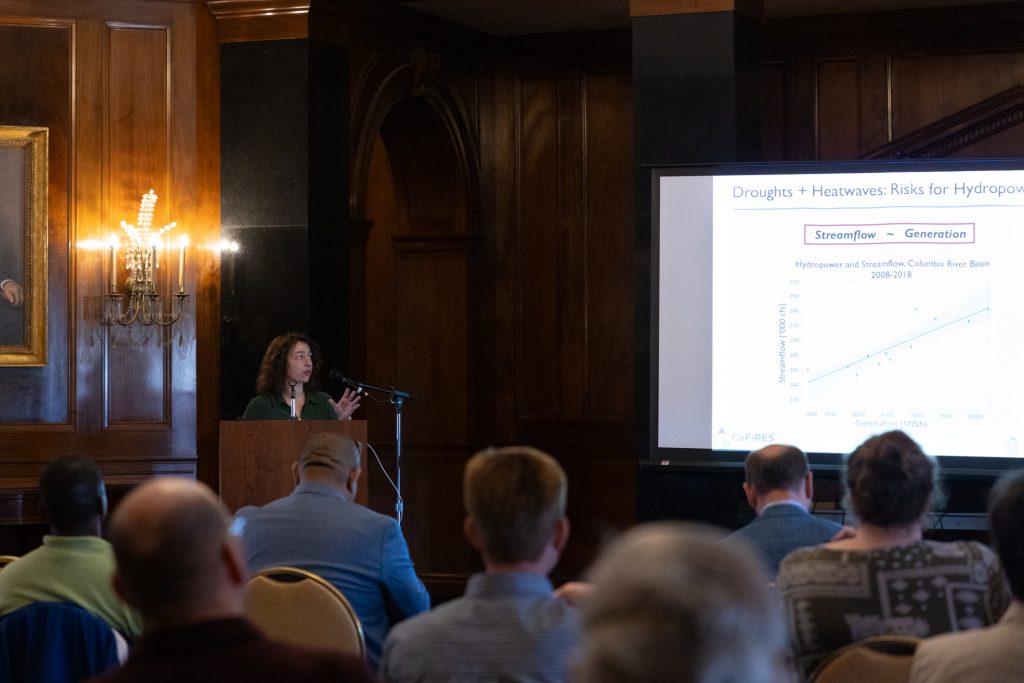IE Center explored droughts, floods, infectious disease and extreme temperatures at 7th annual retreat
November 29, 2023
The UNC Center on Financial Risk in Environmental Systems (CoFiRES) brought together professionals and students for its seventh annual strategic planning retreat at the Morehead Planetarium on Oct. 13.
“Environmental financial risks are growing,” CoFiRES Director Greg Characklis shared in his opening remarks at the retreat. “These are billion-dollar events. We’re talking about droughts, floods, infectious disease and extreme temperatures.”
CoFiRES, a partnership between the Department of Environmental Science and Engineering at UNC’s Gillings School of Global Public Health and the UNC Institute for the Environment (IE), focuses on interdisciplinary research to help understand, quantify and manage environmentally-related financial losses.
The Center is involved in projects across the country, addressing risks associated with environmental events – especially those associated with hydrological extremes. These projects are funded by the National Science Foundation (NSF), Department of Energy (DOE), National Institute of Environmental Health Sciences (NIEHS) and North Carolina Collaboratory with funds provided by the North Carolina General Assembly.
“The work here is done by a very bright and motivated group of graduate students and researchers,” Characklis said. “I’m very fortunate to work with this assemblage of talented people.”
During the retreat, graduate students and researchers at the Center presented their projects as lightning talks, then led discussions to address questions from attendees, which included students, faculty, CoFiRES alumni and professionals from both the public and private sectors.
“We work with people from across the school, across the university and with faculty at other universities across the country,” Characklis said.
Interacting with people from a broad range of backgrounds supports the Center’s interdisciplinary approach to research.
In the morning, the talks focused on several topics: flooding, energy, infectious disease, infrastructure, transportation and western water challenges. Each topic was addressed by three to four student or researcher-led presentations.
In the afternoon, the focus shifted to a discussion of new opportunities for managing environmental financial risk in the developing world, future directions in assessing and managing flood-related financial risk, and drought-related financial risk in the Western United States.
“With increasing impacts and risks to communities from environmental uncertainty, the work by the CoFIRES team is more relevant and important than ever before,” said Susan Cohen, associate director at IE. “Their efforts and collaborative approaches in developing strategies to mitigate risk associated with extreme environmental conditions and events always prompt me to think about new ways to approach risk in my resilience work.”
The retreat culminated in a social hour for attendees to exchange ideas and further discuss the content of presentations.
The Center has been operating since 2017 and hosts many smaller-scale events such as seminars and guest speakers. However, the strategic planning retreat, held each fall, remains the Center’s focal event.
“Each year, the crowd at the CoFiRES retreat continues to grow,” Characklis said. “This year we attracted our most diverse group ever with a range of participants from academia, government, and the private sector. All of these individuals bring new perspectives to our research and ensure that it is both technically rigorous and relevant to addressing real-world challenges.”
See more photos from the event in our Flickr slideshow.
Story and photography by Natalie Peoples
Natalie Peoples is a student at UNC-Chapel Hill. Peoples is currently a junior from Kensington, Maryland, pursuing a double major in journalism and environmental science. In addition to her work as a communications intern for the Institute for the Environment, she has experience in photojournalism and environmental research. Peoples plans to pursue a career in environmental journalism with a special interest in marine science.

